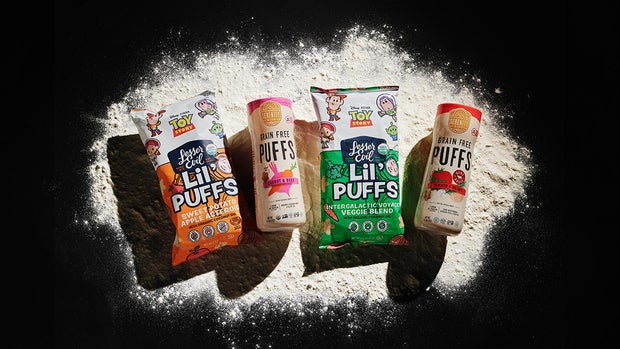CBS News
Some veggie puffs contain high levels of lead, Consumer Reports finds

Some veggie puffs made by Lesser Evil and Serenity Kids contain concerning levels of lead, a heavy metal linked to developmental and other disabilities in children, according to findings released Wednesday by Consumer Reports.
Parents may see veggie puffs, marketed as a healthy alternative to sugar-laden snacks, as a way to make foods like beets, carrots, potatoes and tomatoes palatable for kids. But certain cassava-based brands have excessive amounts of lead or other heavy metals, making even a single serving unhealthy in the case of one product, the advocacy group cautioned.
Troublesome levels of lead were found in both Lesser Evil puff products tested and one from Serenity Kids, Consumer Reports found. Lesser Evil’s Lil’ Puffs Intergalactic Voyager Veggie Blend puffs had more lead per serving than any of the 80 baby foods the watchdog has tested since 2017, the group noted.
“We think kids should consume less than half a serving a day of those,” James E. Rogers, head of food safety testing at Consumer Reports, said in a statement.
As for the other two puff products that showed high lead levels — Lesser Evil’s Lil’ Puffs Sweet Potato Apple Asteroid and Serenity Kids’ Tomato & Herb Bone Broth puffs — Consumer Reports advises limiting consumption to 1.5 servings a day.
Puffs and other snacks made with rice can be high in arsenic, prior tests by Consumer Reports found. That prompted some manufacturers to use other starches, such as the root cassava or sorghum, a gluten-free grain.
Consumer Reports found very low levels of lead in two sorghum-based products from Once Upon a Farm, a company co-founded by actress Jennifer Garner. The company’s snacks also yielded some of the lowest lead levels of all the baby foods tested by Consumer Reports, it noted.
“Clearly, some manufacturers need to do a better job of keeping heavy metals out of their snack foods, and there may be some particular concerns about foods made with cassava,” Rogers said.
Scott Meadows/Consumer Report
Parents who have given their children cassava puffs should not panic, but instead be cognizant that the amounts found by Consumer Reports could over time raise the risk of developmental problems, such as lower IQ, ADHD and autism.
“You have to account for the fact that small amounts of lead can add up and that children may be exposed to some lead in drinking water or their environment,” Rogers said. “That’s why foods with more lead should be minimized in a child’s diet.”
Lesser Evil said that all of its products adhere to regulatory requirements. “Lesser Evil was built on a mission to create better, cleaner, more natural products than the highly processed and refined snacks that overtook grocery store shelves for years,” the company told CBS MoneyWatch in a statement.
The company’s products “all meet GRAS (Generally Recognized as Safe) standards and federal regulations for organic products,” Lesser Evil stated, adding that “we conduct extensive testing for all Lesser Evil products that complies with California Prop 65 and federal standards.”
Sami Rosnov, chief of operations at Corner Market Communications, which represents Lesser Evil, told Consumer Reports that lead occurs in nature “due to years of pollution and contamination in our water and soil.”
Serenity Kids also defended the company’s products, including its testing and quality assurance practices.
“Our puffs are and have always been safe for consumption. All of our products test well below the Maximum Allowable Dose Levels (MADLs) established by California Proposition 65,” the company said in a statement.
“We have always addressed lead and all heavy metals head on because we are confident in the safety of our products and ingredients, and because we believe that our products are healthier than the alternatives that exist today,” the company added.
In a statement, Once Upon a Farm also noted that heavy metals occur naturally in the environment, making them “virtually impossible” to avoid. “Our standard is to minimize their presence to consumable levels in all our products,” the company told CBS MoneyWatch.
Once Upon a Farm said it also seeks to reduce heavy metals in its products by using organic ingredients from global regions that have taken steps to lower risks and by testing the materials most likely to contain metals. Emily Luna, baby brand manager at Once Upon a Farm, also said the company chose sorghum for its puffs in part because it’s less likely to contain heavy metals than rice or cassava.
The findings follow the release of separate results in April in which Consumer Reports found that Lunchables, another popular food product for kids, contains troublesome levels of lead and sodium.
“The classification of foods should be based on scientific evidence that includes an assessment of the nutritional value of the whole product, not restricted to one element such as a single ingredient or the level of processing,” a spokesperson for Kraft Heinz said in defending the 35-year-old brand.
A government report in 2021 found that baby food made by several of the nation’s biggest manufacturers had “significant levels” of substances including lead, arsenic, cadmium and mercury, prompting the FDA to propose limits on arsenic, lead and mercury in baby food.
CBS News
McDonald’s investing $100 million to lure customers back to the fast food giant after E. coli outbreak

McDonald’s is investing $100 million to bring customers back to stores after an outbreak of E. coli food poisoning tied to onions on the fast-food giant’s Quarter Pounder hamburgers.
The investments include $65 million that will go directly to the hardest-hit franchises, the company said.
The U.S. Centers for Disease Control and Prevention has said that slivered onions on the Quarter Pounders were the likely source of the E. coli. Taylor Farms in California recalled onions potentially linked to the outbreak.
The E. coli outbreak has sickened 104 people in 14 states, federal health officials said in an update on Wednesday.
At least 34 people have been hospitalized, and four developed hemolytic uremic syndrome (HUS), a serious condition that can cause kidney failure. An 88-year-old man who resided in Grand Junction, Colorado, died, as previously reported. The illnesses began at the end of September, and the most recent onset of illness occurred as of Oct. 21, according to the U.S. Food and Drug Administration.
The Food and Drug Administration has said that “there does not appear to be a continued food safety concern related to this outbreak at McDonald’s restaurants.”
However, the outbreak hurt the company’s sales.
Quarter Pounders were removed from menus in several states in the early days of the outbreak.
In a statement Wednesday obtained by CBS News, McDonald’s said it had found an “alternate supplier” for the approximately 900 restaurants that had temporarily stopped serving Quarter Pounders with slivered onions.
“Over the past week, these restaurants resumed the sale of Quarter Pounder burgers with slivered onions,” McDonald’s said.
CBS News reached out to McDonald’s on Saturday for a statement regarding the reported investment.
CBS News
U.S. health officials report 1st case of new form of mpox in a traveler

Health officials said Saturday they have confirmed the first U.S. case of a new form of mpox that was first seen in eastern Congo.
The person had traveled to eastern Africa and was treated in Northern California upon return, according to the California Department of Public Health. Symptoms are improving and the risk to the public is low.
Mpox is a rare disease caused by infection with a virus that’s in the same family as the one that causes smallpox. It is endemic in parts of Africa, where people have been infected through bites from rodents or small animals.
Earlier this year, scientists reported the emergence of a new form of mpox in Africa that was spread through close contact including through sex.
More than 3,100 confirmed cases have been reported just since late September, according to the World Health Organization. The vast majority of them have been in three African countries – Burundi, Uganda, and the Democratic Republic of the Congo.
Since then, cases of travelers with the new mpox form have been reported in Germany, India, Kenya, Sweden, Thailand, Zimbabwe, and the United Kingdom.
Health officials earlier this month said the situation in Congo appears to be stabilizing. The Africa Centers for Disease Control and Prevention has estimated Congo needs at least 3 million mpox vaccines to stop the spread, and another 7 million vaccines for the rest of Africa.
The current outbreak is different from the 2022 global outbreak of mpox where gay and bisexual men made up the vast majority of cases.
CBS News
China school knife attack kills at least 8, wounds 17, days after fatal car attack killed dozens

Eight people were killed and 17 others wounded Saturday in a knife attack at a vocational school in eastern China, and the suspect — a former student — has been arrested, police said.
The attack took place in the evening at the Wuxi Vocational Institute of Arts and Technology in the city of Yixing in Jiangsu province, police in Yixing said in a statement, confirming the toll.
This was the second incident of fatal violence in China in a matter of days.
Earlier this week, a 62-year-old man killed 35 people and wounded more than 40 more when he rammed his small SUV into a crowd in the southern city of Zhuhai. The suspect was discovered in the car with a knife, with wounds to his neck thought to be self-harm injuries, according to the police.
Police said the suspect in the knife attack was a 21-year-old former student at the school who was meant to graduate this year, but failed his exams.
“He returned to the school to express his anger and commit these murders,” police said, adding that the suspect had confessed.
In Yixing, police said emergency services were fully mobilized to treat the wounded, and provide follow-up care for those affected by the attack.
Violent knife crime is not uncommon in China, where firearms are strictly controlled, but attacks with such a high death toll are relatively rare.
In recent months, there has been a spate of other attacks.
In October in Shanghai, a man killed three people and wounded 15 others in a knife attack at a supermarket.
And the month before, a Japanese schoolboy was fatally stabbed in the southern city of Shenzhen, which borders Hong Kong.


